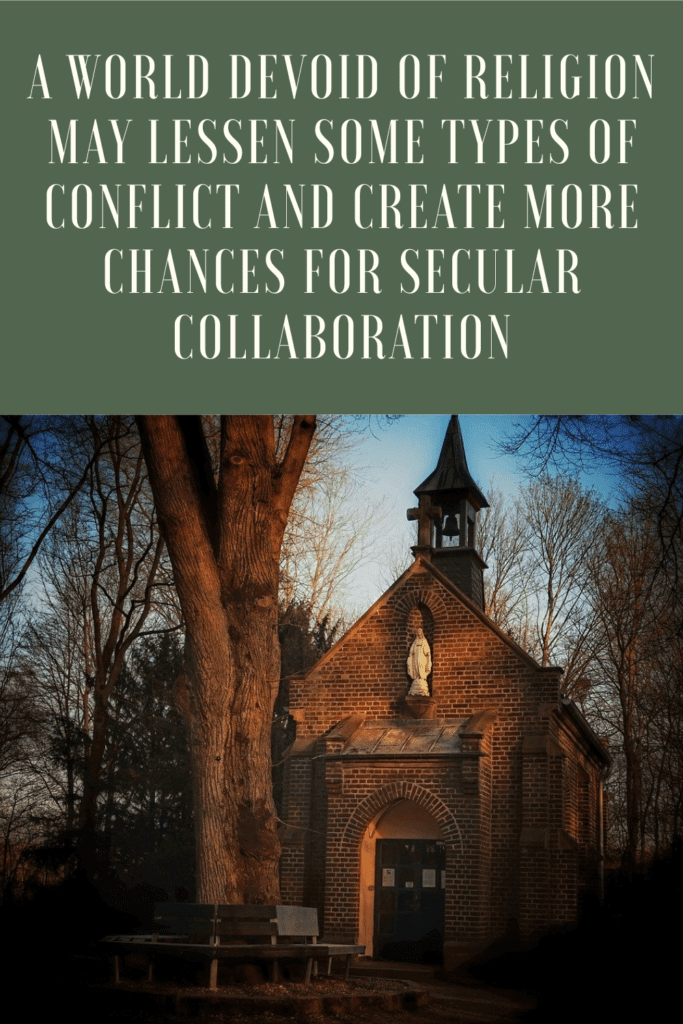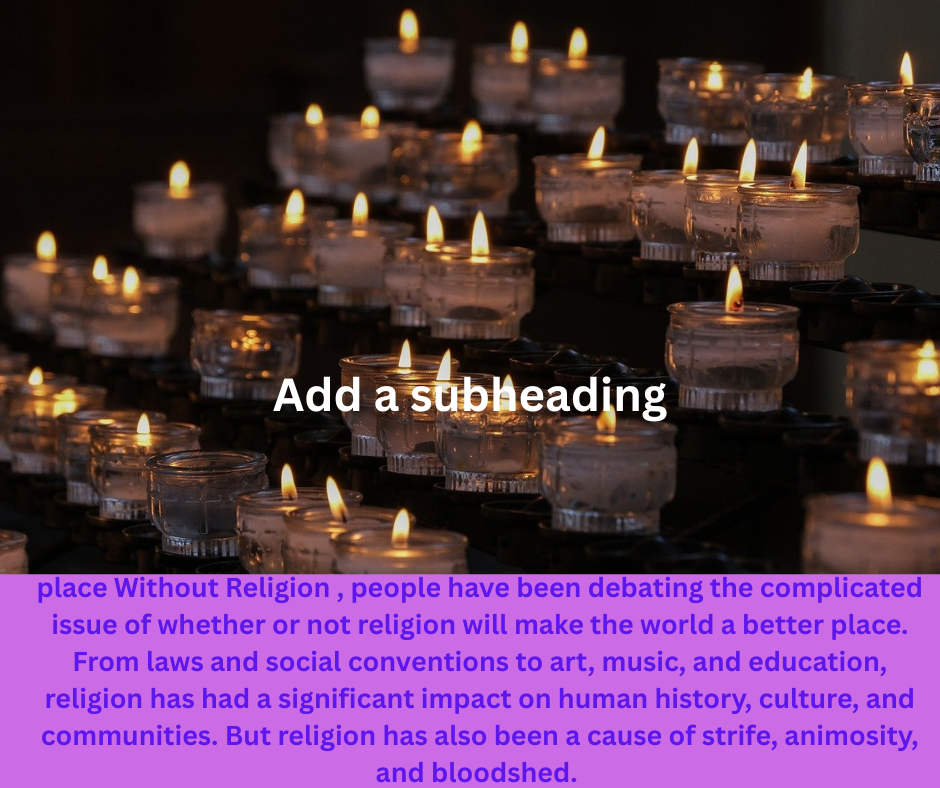Place Without Religion , people have been debating the complicated issue of whether or not religion will make the world a better place. From laws and social conventions to art, music, and education, religion has had a significant impact on human history, culture, and communities. But religion has also been a cause of strife, animosity, and bloodshed.

Table of Contents
While some contend that a world devoid of religion may be more tranquil, logical, and forward-thinking, others maintain that religion offers essential moral and spiritual guidance that is difficult to replace. In order to fully examine this subject, one must take into account both the advantages and disadvantages of religion in addition to the possible outcomes of a world devoid of it.
The Role of Religion in Society
For thousands of years, religion has been an essential aspect of human life. It has given people a feeling of camaraderie, meaning, and purpose across all cultures. It has provided solutions to the most important questions in life, such as: Why are we here? What is the universe’s nature? After death, what happens? Place Without Religion , People have used these responses to help them deal with existential ambiguity, grief, and pain.
Apart from offering spiritual direction, religion has influenced other facets of human society. The creation of ethical frameworks, like the Five Precepts in Buddhism or the Ten Commandments in Judaism and Christianity, for instance, has impacted the moral standards of communities all over the world. Religious concepts have affected many legal systems, and religious organizations have long been active in social services, education, and charity endeavors.
Additionally, religion is essential for fostering social cohesiveness and community. Many people find comfort, support, and a sense of belonging in religious institutions. Religious festivals, rituals, and get-together foster a sense of community and a common identity among believers. Especially in times of crisis, this community aspect of religion frequently serves as a source of fortitude, resiliency, and togetherness.
The Negative Aspects of Religion
Throughout history, religion has caused strife and discord despite its beneficial effects. Millions of people have died in wars, persecutions, and acts of violence because of religious disputes. The Thirty Years’ War, the Crusades, the Inquisition, and many other wars have shown how religion can be exploited as an excuse for oppression and bloodshed.
The fact that religion frequently results in the “othering” of those who hold different beliefs is among its most important critiques. Place Without Religion ,The idea that only one’s own religion is true, or religious exclusive, can promote intolerance and divisiveness.
Historically, religious organizations have persecuted and discriminated against minorities on the basis of their beliefs, gender, sexual orientation, or ethnicity. For instance, religious prejudice has resulted in the abuse of non-believers and those of other faiths, and women have historically been disenfranchised in many religious traditions.
Furthermore, religious leaders and organizations have the ability to influence governments and society, demonstrating how religion has occasionally been utilized as an instrument of political power. This has frequently led to the restriction of individual liberties, the repression of dissent, and the application of religious legislation to non-believers.
For instance, people may be persecuted for their religious convictions or for refusing to practice religion at all in nations where religion and the state are closely entwined.
Additionally, religion has come under fire for occasionally impeding scientific advancement. There have been times throughout history when scientific advancements and religious doctrine have clashed. One well-known example of how religion has occasionally impeded the spread of science is Galileo Galilei, who was persecuted by the Catholic Church for endorsing the heliocentric model of the solar system.
The conflict between science and religion still exists in several fields, especially when it comes to issues like evolution, climate change, and medical ethics, even though many religious people and organizations now support scientific initiatives.
The Argument for a World Without Religion
The potential for increased equality, peace, and advancement is frequently the main worry of those who contend that the world would be a better place without religion. Proponents contend that if there were no religious distinctions, societies would be less split by sectarian strife and more focused on their shared humanity and objectives.
In a society without religion, some feel that human beings would be more likely to base their moral and ethical decisions on reason, empathy, and common values, rather than religious dogma. Place Without Religion ,Human welfare, equality, and the role of reason in moral judgment are all emphasized by secular moral systems like utilitarianism and humanism. These schools of thought contend that people can lead morally upright lives without the support of religion or supernatural forces.
Furthermore, since opposing religious philosophies would not separate individuals, a world devoid of religion might be more accepting. More societal cohesion and collaboration may result from the ease of religious tension. Without the barriers caused by religious differences, people could concentrate on tackling issues like poverty, climate change, and human rights. Furthermore, a lot of people contend that secular cultures are better at putting individual liberties and rights first than religious ones.
The idea says that if there were no religion, people would be more free to follow their own personal convictions and ways of life without worrying about retaliation. Since civil rights and individual liberty are frequently valued more highly in secular nations, women, LGBTQ+ people, and other marginalized groups may experience greater equality and freedom.
Last but not least, those who advocate for a future devoid of religion frequently highlight the possibility of advances in science and technology. Place Without Religion ,Some people think that humanity could advance even further in fields like space exploration, environmental sustainability, and medical development if religion didn’t get in the way.
Instead of religiously motivated ideas that could impede progress, the focus would be on evidence-based solutions to the world’s issues.
The Argument for Religion’s Importance
However, a lot of people think that religion is crucial to improving the world. The fact that religion offers moral direction that goes beyond human logic is one of the main causes. Place Without Religion , Religion frequently offers a more profound, transcendent sense of purpose and meaning, even when secular ethical frameworks are as significant.
Religion provides many people with a framework for comprehending their role in the cosmos and finding serenity during trying times.
Additionally, religion creates a sense of belonging and community that is hard to duplicate in a secular culture. Religious groups offer social networks, emotional assistance, and support systems—all of which are particularly crucial during personal crises.
Numerous religious organizations actively engage in humanitarian endeavors, offering assistance to the underprivileged, ill, and disenfranchised. For instance, Christian, Muslim, and Hindu groups provide aid to those in need by managing schools, clinics, and relief initiatives all around the world.
